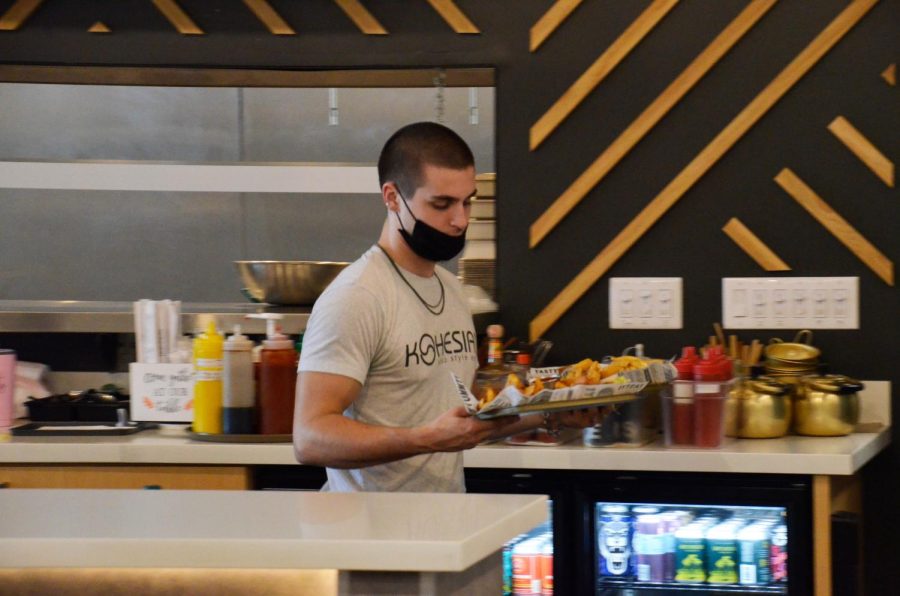Open For Business?
Local restaurants meet the challenge of COVID-19
Photo: Jack Seigerman
A Kohesian server brings out food to hungry diners in the weeks before December closure. Kohesian was one of the many restaurant to experience decrease in sales during the pandemic.
According to theNational Restaurant Association, more than 110,000 restaurants in the United States closed in 2020, either temporarily or permanently.
In March of 2020 businesses across the country were forced to shut down for a variety of reasons — employees quitting, local and national mandates and a lack of customers. This hit restaurants particularly hard, both nationally and here in Shelby County.
Kohesian, a Korean-fusion restaurant formerly located in Germantown, opened three months before the country went into lockdown. However, during quarantine the business experienced a decrease in sales. In December, Kohesian announced its closing, unrelated to the pandemic.
“When COVID first hit, we took a huge plummet,” said Kohesian’s owner and president Julie Kim.
At the beginning of the pandemic, the restaurant was struggling to pay its weekly expenses due to the reduced business.
“We’re paying out payroll while, you know, sales aren’t hitting nearly anything,” she said. “We were having $100 days. Just to open with lights on and everything, financially, it was hard.”
Over a year and a half into the pandemic, restaurants are still struggling to reach pre-pandemic levels of success. For Kohesian, Kim said she observed that the number of people eating out is directly related to the number of local cases.
“Our sales trend follows exactly where the mandates are,” Kim said.
While the future of COVID is unknown, Kim had hoped to stay open with the support of the local community, but sometimes that isn’t enough.
“It’s a struggle, but I mean, what can we do?” she said.
While most restaurants have struggled, some have had it easier than others.
Memphis Pizza Cafe has been a local staple for nearly 30 years. Owner and operator Gary Garlington founded the restaurant in 1993, and what started as one location turned into a chain of four businesses.
“We’re just very fortunate to come in and make a mark in the city,” he said. “You say you’re go- ing to open a pizza shop and who knows if it’s going to ever work out or not.”
The restaurant has always offered a combination of dine-in and take-out services, so they were able to adapt to the ongoing pandemic.
Sales of pizza grew as much as 4% in 2020, according to food industry research and consulting firm Technomic. It was one of only two food categories to have any growth that same year, with the other being chicken.
“What’s easy to pick up and take home? Pizza, Mexican food, burgers, Huey’s. Those kinds of places — from my limited knowledge of the people I’ve talked to — have thrived during the pandemic,” he said.
Garlington also said that Memphis Pizza Cafe didn’t face issues of understaffing like many other restaurants.
“A lot of restaurants you go into them, and they’re only using half the dining room because they only have just a couple of servers,” Garlington said. “The Pizza Cafe hasn’t really had that. We’ve always had enough servers and enough kitchen people where we haven’t had to change any hours or change the way we do anything.”
Despite the success of pizza in a time when people are hesitant to leave home, it hasn’t been entirely smooth sailing for the restaurant. Like many businesses, Memphis Pizza Cafe has struggled getting supplies.
“One of our vendors recently started just blowing our orders off,” he said and cited supply trucks that arrived late or not at all. Not only have deliveries failed to arrive, but Garlington has faced an unforeseen loss of key ingredients.
He said two salad dressings have been discontinued and that their tomato growers ran out of both pizza sauce and tomatoes for the first time ever last year.
Despite the difficulties and limitations presented by the pandemic, Garlington attributed his relative success to the people of Memphis.
“People would come in and their pizza was $18, but they would leave $40 and say keep the change,” Garlington said. “There’s just a real sense of community and taking care of our employees. I can’t tell you how many people have been really appreciative of us staying open.”
What about businesses that did not have an established presence like that of Memphis Pizza Cafe?
Amy Green opened Mojo Nutrition with her cousin Monica Staten Garay in September of 2020 during the pandemic.
In June of 2020, Green had lost her job, something she had been expecting. Since waiting wasn’t a very palpable option anymore, she pushed on and — with Garay — opened Mojo Nutrition.
They sell nutritional teas and shakes that Green said are “just a lot better than drinking a lot of the sugar like your Starbucks. Ours actually have some nutritional value and vitamins and stuff in them.”
Opening a restaurant is intimidating even in the best of times. According to a 2017 Forbes article, 17% of restaurants close within their first year of business, though some estimates put the pre-pandemic closure rate even higher.
“It was scary to decide to start during the pandemic because you don’t know what to expect,” she said. “It was fine in the beginning and then you had the mask man- dates and everything else coming in… It made it more difficult. You have a range of people, some that want to wear them and some that don’t.”
Since the majority of their business is people grabbing a drink and heading out as opposed to sitting down and enjoying a meal, they weren’t faced with the same challenges more traditional sit- down restaurants were.
This doesn’t mean that Mojo Nutrition was immune from the struggles many faced during the pandemic, though. Ever-changing mask mandates and rises in cases were the two most noticeable variables when it came to quantity of customers and atmosphere.
“I have been able to tell — as far as when the Covid does rise — we have been a little bit slower,” she said.
Green has said that, despite all the challenges brought on by the pandemic, the relationships she has forged with the people of Collierville and Germantown have given her a sense of hope.
“Everybody has been very welcoming,” she said. “And I live in Olive Branch and [Garay] lives in Hernando, and I wasn’t sure how people would take us being here since we weren’t residents of Collierville, and we have met some of our best friends here, and they’re like our family.”
Garlington reported a similar sense of community in his restaurants. The normalcy granted by their continued local presence was well-appreciated.
“People are just really appreciative of us staying open. We heard that a lot the first few months. ‘Thanks for staying open, thanks for thanks for keeping everybody employed,’ things like that,” he said. “The tip outs that our employees have got have just been so, so generous since this whole thing started. It’s just really shocking how it’s all turned out.”
Kohesian wasn’t around nearly as long as Memphis Pizza Cafe, and yet the local community still did all they could to support them through the pandemic. The overwhelming local response encouraged Kim to perservere through an uncertain period of time for as long as she could. Before Kohesion closed Kim expressed her grateful- ness to her customers.
“The customers that come in here, they say, ‘Hey, you know, like, hang in there,’ I mean, even just that, or like, ‘we appreciate that you guys chose this city to open
up in,’ even those little words, they’re all about encouragement,” Kim said. “You just feel this sense of support from them. And it’s awesome.”
Additional reporting by Lauren Shang











